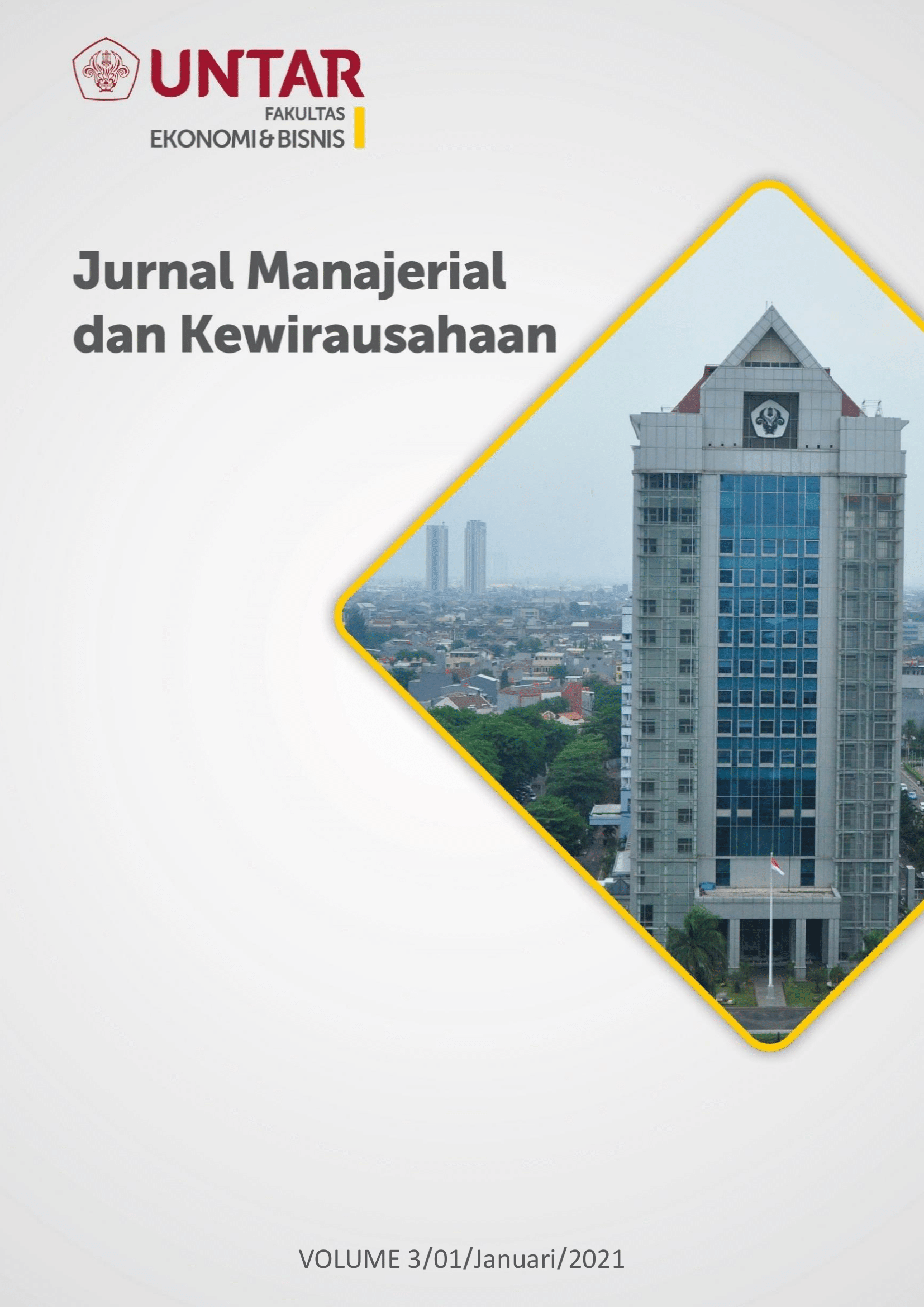Pengaruh Customer Satisfaction, Perceived Value, Dan Trust Terhadap Online Repurchase Intention Pada Fashion Di Instagram Di Jakarta
Main Article Content
Abstract
The fast growing internet has resulted in competitive businesses, namely providing opportunities and challenges for various businesses. One of these business opportunities is to do business online. Online transaction systems require customers to buy and make payments for products and services using internet platforms such as social media. The purpose of this study was to study the effect of customer satisfaction, perceived value, and trust in online repuchase intentions on Instagram. Data was collected by survey questionnaire. This study collected 115 valid responses from Instagram users who must have made an online purchase before at least once. SmartPLS 3.0 is used for approved approved studies. The results show that (1) There is a significant positive effect on customer satisfaction with online repurchase intentions. (2) There is a significant positive effect of perceived value on online repurchase intentions. (3) There is a significant positive effect of trust on online repurchase intentions.
Internet yang cepat berkembang telah menciptakan bisnis yang kompetitif, yaitu memberikan peluang dan tantangan untuk berbagai bisnis. Salah satu peluang bisnis ini adalah dengan melakukan bisnis online. Sistem transaksi online meminta pelanggan untuk membeli dan melakukan pembayaran untuk produk dan layanan menggunakan platform internet seperti sosial media. Tujuan dari penelitian ini adalah untuk mengetahui pengaruh customer satisfaction, perceived value, dan trust terhadap online repuchase intention pada fashion di Instagram. Data dikumpulkan dengan membagikan kuesioner survei. Penelitian ini mengumpulkan 115 tanggapan valid dari pengguna Instagram yang pasti pernah melakukan pembelian online sebelumnya minimal satu kali. SmartPLS 3.0 digunakan untuk memverifikasi kerangka penelitian. Hasil menunjukkan bahwa (1) terdapat pengaruh positif yang signifikan customer satisfaction terhadap online repurchase intention. (2) terdapat pengaruh positif yang signifikan perceived value terhadap online repurchase intention. (3) terdapat pengaruh positif yang signifikan trust terhadap online repurchase intention.
Article Details
Section
This work is licensed under a Jurnal Muara Ilmu Ekonomi dan Bisnis Creative Commons Attribution-ShareAlike 4.0 International License.,/p>
References
Chen, Y.S. (2010). The drivers of green brand equity: Green Brand Image, Green Satisfaction, and Green Trust. Journal of Business Ethics, 93(2), 307-319.
Chiu, C. M., Hsu, M. H., Lai, H., & Chang, C. M. (2012). Re-examining the influence of trust on online repeat purchase intention: The moderating role of habit and its antecedents. Decision Support Systems, 53(4), 835-845.
Chiu, C.M., Linb, H.Y., Sunc, S.Y. and Hsu, M.-H. (2009). Understanding customers’ loyalty intentions towards online shopping: an integration of technology acceptance model and fairness theory. Behaviour & Information Technology, 28(4), 347-60
Cronin, J. J., Brady, M. K., & Hult, G.T. (2000). Assessing the effects of quality, value and customer satisfaction on consumer behavioral intentions in service environments. Journal of Retailing, 76, 193–218.
Gefen, D., Karahanna, E. & Straub, D. W. (2003). Trust and TAM in Online Shopping: An Integrated Model. MIS Quarterly, 27(1), 51-90.
Ghozali, Imam (2014). Structural Equation Modeling, Metode Alternatif dengan Partial Least Square (PLS). (Edisi 4). Semarang: Badan Penerbit Universitas Diponegoro.
Grunert, K.G. and Ramus, K. (2005). Consumers’ willingness to buy food through the internet. British Food Journal, 107(6), 381-403.
Hellier, Phillip K., Gus Geursen, Rodney A. Carr, and John A. Rickard (2003). Customer Repurchase Intention: A General Structural Equation Model. European Journal of Marketing, 37 (11/12), 1762- 1800.
Kotler, Philip (2008). Manajamen Pemasaran Alih Bahasa Benyamin. (Jilid 1 dan 2). Jakarta: PT. Indeks Kelompok Gramedia, 83.
Lee, Chai har, Eze, Uchenna Cyril and Ndubisi, Nelson Oly (2010). Analyzing key determinants of online repurchase intentions. Asia Pacific Journal of Marketing and Logistics, 23(2), 200-221.
Pavlou, P.A. and Fygenson, M. (2006). Understanding and predicting electronic commerce adoption: an extension of the theory of planned behaviour. MIS Quarterly, 30(1), 115- 143.
Phuong, N.N.C., & Trang, T.T.D. (2018). Repurchase Intention: The Effect of Service Quality, System Quality, Information Quality, and Customer Satisfaction as Mediating Role: A PLS Approach of M-Commerce Ride Hailing Service in Vietnam. Marketing and Branding Research 5, 78-91.
Reichheld, F. F., & Schefter, P. (2000). E-loyalty: Your secret weapon on the Web. Harvard Business Review, July-August, 105-13.
Zeithaml, V.A. (2000). Service Quality, Profitability, and The Economic Worth of Customers: What We Know and What We Need to Learn. Academy of Marketing Science Journal, 28(1), 67-85. Zhao, G.M. (2010). Research on Customer Loyalty of B2C E-commerce. China-USA Business Review, 9(5), 46-52.

